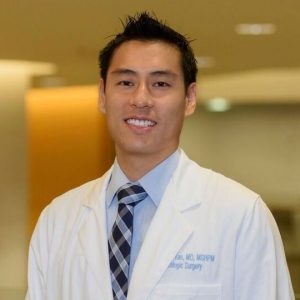It is with great pleasure that we announce that Hung-Jui “Ray” Tan, MD, MSHPM has been awarded a Mentored Research Scholar Grant in Applied and Clinical Research by the American Cancer Society.
This award will directly support Dr. Tan’s research in Designing Visual Tools to Enhance Cancer Surgeon Decision-Making as well as additional career development in medical decision-making, clinical informatics, and implementation science. This award runs through the end of 2023.
“I am incredibly grateful to the American Cancer Society. With their generous support, I will work to apply advances in clinical informatics and information visualization to better communicate risk data to surgeons. My hope is that this will improve decision-making and ultimately outcomes for patients with cancer.”
Hung-Jui (Ray) Tan, MD, MSHPM
Urologic Oncology Fellowship Program Director
Assistant Professor of Urology
About The Project
Urologic cancers currently account for 3 of the 6 most common solid-organ cancers in the US. For most patients, surgery is a viable option and a potential cure. At the same time, surgery can also lead to negative outcomes. For urologic cancers, this includes urine leakage and impotence after prostate removal, kidney failure after kidney removal, and global functional decline after bladder removal. With the added risks for surgical complications and death, the decision to pursue surgery can be very complex.
While patient preference and values are paramount to high-quality shared decision-making, patients often rely on their surgeon for knowledge and treatment recommendations. With that in mind, some surgeons may default to anecdotal evidence and their own experience and intuition despite readily available surgical outcomes data. This could result in unwarranted variation in treatment and potential harm to patients who may not receive the standard of care.
Health information technology (IT) affords new opportunities to provide surgeons with key information at the point of care which can optimize efficiency, enhance risk communication and decision-making, and improve quality of care and outcomes. Unfortunately, much of the currently available Health IT tools can be cumbersome to use and are limited by ineffective or nonengaging design. Emerging techniques in information visualization – a field that draws from graphic design, computer science, and psychology – may appeal intuitively to surgeons and help to promote evidence-based practice in cancer decision-making.
With the support of the American Cancer Society, our project will pursue novel research to design, develop, and test transformative health information technologies that optimize cancer care and outcomes.
Project Structure
The project will start by using surveys and interviews to understand how surgeons use Health IT and how this relates to their decision-making about surgery for cancer. This way, potential barriers to the use of any future visual guides can be identified.
Our data will then be used, along with novel information visualization techniques, to create a visual risk display. The effect of this visual display on surgeon perception and judgment will be fine-tuned using an online randomized experiment.
Next, we will use these results to develop and pilot a prototype visual decision support tool with the community and academic urologists here in North Carolina.
Future Applications
This research will provide critical new insights on Health IT behavior, medical decision-making, and intervention design using novel visualization techniques. Our discoveries will pave the way for future Health IT solutions that will enhance decision-making across cancer sites and for both clinicians and patients.
About American Cancer Society Grants
Hung-Jui Tan, MD was supported by a Mentored Research Scholar Grants in Applied and Clinical Research, MRSG-18-193-01 – CPPB, from the American Cancer Society. The American Cancer Society is a nationwide, community-based voluntary health organization dedicated to eliminating cancer as a major health problem. The American Cancer Society provides critical support to research and clinician-scientists through Research and Training Grants made possible from funds contributed by the public. For more information about these awards, please visit the American Cancer Society website at https://www.cancer.org/research/we-fund-cancer-research/apply-research-grant/grant-types.html

